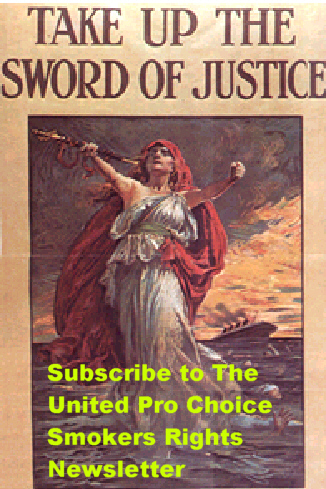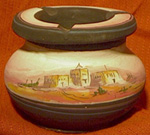Confessions Of A Coffee Addict
The United Pro Choice Smokers Rights Newsletter
Voters for Fairness and Freedom
Smokers Welcome Chat Rooms Schedule

By Paul Warme
January 1st, 2010
New Years Day is a time for resolutions. I have tried to quit drinking coffee, but I suppose I'm addicted. Maybe next year.
Here I am, in my basement coffee bar, preparing my first coffee of the day. The bag of coffee beans is labeled with a prominent message: WARNING: The Surgeon General has determined that drinking coffee or exposure to coffee fumes is hazardous your health.
Two tablespoons of coffee beans into the grinder, I turn it on, and ... Ah, what a delicious smell. My mind snaps to attention. Two cups of water in the coffeemaker and I watch as the brown liquid trickles slowly into the pot. The wonderful smell of fresh coffee makes my mouth water with anticipation. My first sip of the strong coffee tastes slightly bitter, but the second sip saturates my taste buds and fills my nostrils with pleasure.
Now I am really awake and ready to face the world. Quite a small world, actually. My coffee bar is a 10 foot by 12 foot room in the basement of our home. I keep the door closed to prevent coffee vapors from escaping into the rest of the house. A small fan vents to the outside. I hear the sounds of my family eating breakfast in the kitchen. I used to drink my morning coffee in the kitchen with them, but now I am reconciled to sipping alone. The dangers of secondhand coffee fumes are discussed almost every day in the newspapers and TV news. I am skeptical, but if there's any truth to the anti-coffee claims, I wouldn't want to expose my family.
New Year's Day is also a time for reflecting on the past. These last ten years have brought remarkable changes for coffee drinkers. It all started when a scientist named John Brown at the National Cancer Institute decided, for some reason, to paint coffee extract on the shaved backs of 20 mice. After nine months of daily applications, three of the mice developed tumors. Never mind that the amount of coffee extract used for the daily treatment was equivalent to drinking 18 gallons of strong coffee per day for a human. Can you imagine shaving your back and painting ground coffee sludge on it? Did they wash the mice each day before applying the daily goo? Did the mice die from the tumors? All good questions, but I don't have the answers. Suffice it to say that the Brown study started an avalanche of propaganda that turned the country against coffee drinkers. Net result: I now huddle in my basement, sipping the evil brew.
About a year after the Brown study, epidemiologists reported alarming statistics:
1. Coffee drinkers are twice as likely as non-drinkers to develop cancer of the mouth, throat, esophagus, stomach, small and large intestine.
2. Heart rate and blood pressure are elevated for up to two hours after drinking a cup of coffee. High blood pressure is known to be associated with heart disease.
3. Women who drink more than two cups of coffee per day are almost three times as likely as non-drinkers to develop fibrocysts in the breast, which is often a precursor to breast cancer.
4. Levels of coffee byproducts in the blood of nursing infants was found to be up to 20 percent of the levels in their coffee drinking mothers. Early exposure to coffee from mother's milk may predispose infants to become coffee addict's later in life.
5. Kidney failure sometimes occurs among heavy coffee drinkers. The known diuretic effects of coffee are thought to be a burden on the kidneys, possibly leading to renal problems.
6. Coffee drinking tends to leach calcium from the bones. Osteoporosis is common among coffee drinkers. Among older people, osteoporosis often leads to bone breakage, hip fractures, and ultimately leads to death.
7. Coffee is often used as a substitute for eating, possibly leading to malnutrition. Malnutrition is a problem that is especially dangerous for pregnant women because the fetus may also suffer from malnutrition.
8. It is well known that coffee stunts growth in young people. Many researchers are investigating plausible mechanisms whereby coffee stunts growth.
9. Caffeine is now recognized to be addictive, as that term is commonly understood. Withdrawal symptoms include headaches, nervousness, cold sweats, lethargy, dropsy, narcolepsy, and other physical and psychological reactions that compel coffee addicts to continue indulging their harmful addiction.
10. As many as 423,000 people die each year of coffee-related diseases, including cancer of all types, heart disease, kidney failure, and other forms of coffee poisoning.
In response to these alarming statistics, the Surgeon General required a warning label on all coffee products sold after Jan. 1, 2003:
WARNING: the Surgeon General has determined that drinking coffee or exposure to coffee fumes is hazardous to your health. Coffee companies were required to include this warning in all advertisements. More recently, of course, coffee advertising has been banned in most states.
After learning about the dangers of coffee, the public outcry during the next year was predictable. Many people, especially pregnant women, said that the smell of coffee nauseates them. Some sensitive individuals in offices declared that coffee vapors from people drinking coffee nearby gives them headaches. Suspicion was growing that secondhand coffee fumes could affect the health of non-drinkers. Several studies were launched to gather information about the hazards of coffee fumes. Finely ground coffee particles were shown to remain suspended in the air for a long time after coffee was ground. When breathed by some people with asthma, these suspended particles were found to cause respiratory trauma.
That's when things really started to get nasty. Non-coffee sections in restaurants, coffee bans in public buildings, and frequent political speeches about the dangers of coffee.
Coffee scientists used gas chromatography to separate coffee fumes into various components and measured the amount of each component. Caffeine was found to be the most addictive component but it was thought to be relatively harmless. Coffee fumes also contain quite a variety of noxious phenols and other aromatic components that contribute to its strong smell. Phenols are among the most carcinogenic compounds known to man. Scientists prepared large amounts of each of these components and fed them to rats or injected them directly into the blood, muscle, or stomach. Many of these components had noxious effects, including vomiting, fainting, internal bleeding, ulcers, convulsions, and even death at the largest doses. [Editors note: the amounts used in these experiments were hundreds of times the amount in a strong cup of coffee.]
When these studies were published, the news media promptly and fully reported each result. More reactions from anti-coffee groups, who said that coffee fumes might be as dangerous as secondhand smoke. This prompted more studies of the relative dangers of coffee and tobacco. To no one's surprise, it was reported that many coffee drinkers are also smokers. One study suggested that some of the respiratory problems formerly attributed to secondhand smoke were actually due to coffee fumes. In fact, since smoking is now banned in most offices, coffee fumes are much more common in the workplace and therefore, a greater danger.
Needless to say, all of this hue and cry about coffee drinking was dismaying to coffee drinkers. Said one coffee drinker, "If I don't drink coffee, I fall asleep at my desk."
"If I don't drink coffee, I get terrible headaches", said another.
The coffee-slurping manager at one large office complex claimed, "Productivity has suffered since we no longer provide free coffee." Jack Schmidt of United Against Coffee (UAC) responded, "One wonders how productive a dead coffee drinker can be." He went on to say, "UAC supports a nationwide ban on coffee. Irresponsible coffee vendors are endangering the youth of this country and we intend to put a stop to it."
That was back in 2003. Funny, but those years now seem like the good old days. Back then, half of all adults still drank coffee at least once a day. The price of coffee in 2003 was about five dollars per pound! That was before governments started taxing coffee. Now, in 2010, coffee taxes are ten dollars per pound (and rising) and coffee costs about 15 dollars per pound. Many people have quit drinking coffee because it's just too expensive.
Government spokesmen say that coffee taxes are justified because people are dying of diseases associated with coffee drinking. "Why should non-coffee drinkers pay the medical expenses of self-destructive coffee drinkers?", asks a UAC spokesman. One cynical coffee drinker dared to suggest that if coffee drinkers die prematurely, lifetime medical expenses might actually be lower because diseases of old age are often prolonged and expensive.
The human costs of the anti-coffee campaigns have not yet been tallied. You hear horror stories… Failed marriages between coffee drinkers and worried non-drinkers. Custody suits to wrest hapless children from coffee-guzzling mothers. People fired from their jobs because they can't perform without a shot of coffee. Coworkers shun coffee drinkers because they reek of noxious coffee fumes. Coffee drinkers forced to buy coffee for five dollars a cup from outdoor coffee vendors. And of course, they must drink the coffee outside in the winter cold. (Tell me, is the risk of death from coffee greater than death from pneumonia?). Worse yet, employers have established coffee bans for their workers both at work and at home. (It seems that some people are so sensitive to coffee fumes that they can smell it on the clothes of coffee drinkers, even hours later). Gang wars over coffee smuggled in from foreign countries in order to avoid taxes. Has anyone noticed that drunken driving incidents are on the rise, possibly because people are afraid to sober up with coffee.
Coffee drinking used to be a social activity, but now it is considered antisocial. Coffee drinkers feel ostracized and estranged from society. Formerly "good" people now feel like criminals. Coffee lovers are considered to be addicts -- pitied by some and scorned by others.
So here I sit, alone, drinking my second cup of coffee, feeling its warmth on my hands and enjoying its aroma. The rich brown color tantalizes me to take another sip. Ahh... Now I am ready to start the day.

